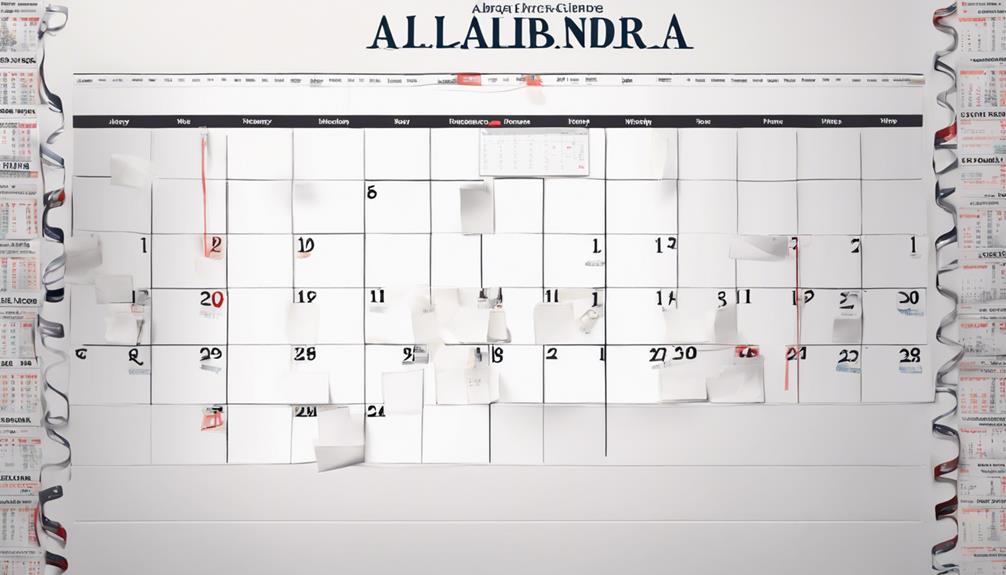When starting the process of getting a divorce in Alabama, you may ask yourself, “How long will this take?” It is important to understand the complexities involved, as there are several factors that can impact the duration and result of your divorce case.
From residency requirements to finalizing the divorce, each step demands attention to detail and adherence to specific legal guidelines.
Stay tuned to uncover the essential steps and considerations that can impact the duration of your divorce in Alabama.
Key Takeaways
- Residency requirements vary based on local or non-local status, impacting where to file.
- Choose between fault-based or no-fault grounds, affecting complexity and duration.
- Follow the filing process accurately, pay fees, and attend court hearings for finalization.
- A mandatory 30-day waiting period exists before the court can issue the final divorce decree.
Residency Requirements
When residing in Alabama, the need for a specific residency period to initiate a divorce is waived if both spouses are local residents. However, if only one spouse is an Alabama resident, a 6-month residency is mandatory before filing for divorce.
During the divorce process, it's crucial to file in the county where your spouse currently resides or where both of you lived at the time of separation. In cases where the spouse is no longer in Alabama, the filing should occur in the county where you currently reside. If none of these scenarios apply, the divorce papers should be filed in the county of your current residence.
Understanding the residency requirements in Alabama is fundamental to navigating the divorce process efficiently. By following these guidelines and ensuring compliance with the county's regulations, you can initiate the divorce proceedings smoothly. Remember, each situation may vary, so it's advisable to consult with a legal professional to guarantee a seamless divorce process in Alabama.
Grounds for Filing

Understanding the grounds for divorce in Alabama is essential for navigating the legal process effectively. In Alabama, individuals have the option of choosing between fault-based grounds and no-fault grounds when filing for divorce. Here are some key points to consider:
- No-fault grounds: No-fault grounds, such as the irretrievable breakdown of the marriage, are commonly used due to their simplicity in not requiring proof of wrongdoing.
- Fault-based grounds: These include reasons like adultery, addiction, mental illness, and abuse, which necessitate providing evidence to support the claim.
- Impact on complexity: The choice between fault-based and no-fault grounds can significantly impact the complexity of the divorce proceedings.
- Impact on duration: The grounds chosen can also influence the duration of the divorce process, as fault-based grounds may require more extensive legal proceedings.
- Legal dissolution: Understanding the grounds for filing is crucial as it sets the foundation for the legal dissolution of the marriage in Alabama.
Filing the Divorce Papers
To file for divorce in Alabama, we must complete specific forms and documents and submit them to the court to initiate the legal dissolution process. It's crucial to ensure that all information provided is accurate and that the other spouse is appropriately served with the divorce papers. Filing fees, which generally range from $150 to $350 depending on the county, must also be paid at the time of filing.
Once the divorce papers are filed, the court will review the documents to ensure they meet all legal requirements. Subsequently, a court hearing will be scheduled to finalize the divorce process. This hearing is a crucial step where both parties may need to appear before the judge to address any outstanding issues and to officially dissolve the marriage.
Navigating the divorce filing process in Alabama requires attention to detail and adherence to the specific procedures outlined by the court. It's essential to follow all guidelines diligently to ensure a smooth and efficient divorce process.
Waiting Period

During the divorce process in Alabama, the minimum 30-day waiting period before a final decree can be issued holds significant importance. It marks the commencement from the date the divorce papers are filed with the court. This interval allows for contemplation and the potential for reconciliation before the divorce is officially recognized. Moreover, this waiting period is a mandatory legal stipulation in Alabama to ensure the proper adherence to due process in divorce proceedings. Once the 30-day waiting period concludes, the court gains the authority to issue the final divorce decree, thereby formalizing the divorce. Essentially, this waiting period acts as a safeguard, affording both parties the opportunity to carefully weigh the decision and its consequences before the divorce is legally concluded.
Finalizing the Divorce
Upon reaching an amicable resolution on all pertinent issues, the divorce decree in Alabama is authenticated by a presiding judge, culminating in the finalization of the marital dissolution. Finalizing the divorce involves submitting the divorce settlement to the court for approval. This step signifies the end of the marriage and solidifies the agreed-upon terms regarding property division, child custody, and alimony. Out-of-court settlements and mediation can streamline the finalization process. Here's a breakdown of key aspects involved in finalizing a divorce in Alabama:
| Aspect | Description |
|---|---|
| Divorce Settlement | Submission to the court for approval |
| Divorce Decree | Signed by a judge |
| Property Division | Resolving assets and debts |
| Child Custody | Determining parental responsibilities |
| Alimony | Deciding financial support post-divorce |
Frequently Asked Questions
Can You Date While Legally Separated in Alabama?
Yes, you can date while legally separated in Alabama. However, it's important to remember that dating during this time can impact aspects of your divorce like child custody or alimony. Consulting with a divorce attorney is advisable.
Is Alimony Mandatory in Alabama?
Alimony in Alabama isn't always mandatory; it hinges on financial need and ability. Factors like marriage duration influence the decision. Payments can be ongoing or temporary for education. Adultery or abuse by the recipient affects alimony.
Is the Divorce Process Similar in Alabama and North Carolina?
Although both Alabama and North Carolina require residency to file for divorce, nuances differ. A “stepbystep divorce guide in nc” emphasizes the importance of understanding North Carolina’s unique procedures, from separation periods to specific documentation, which contrasts with Alabama’s distinct legal mandates and filing processes.
Conclusion
While the divorce process in Alabama may seem daunting, our step-by-step guide can help you navigate each stage with clarity and confidence.
Remember, seeking legal advice can streamline the process and ensure your rights are protected. Don't let the fear of a lengthy or complicated divorce deter you from seeking the freedom and peace of mind you deserve.
You have the strength to make it through this challenging time, and we're here to support you every step of the way.










